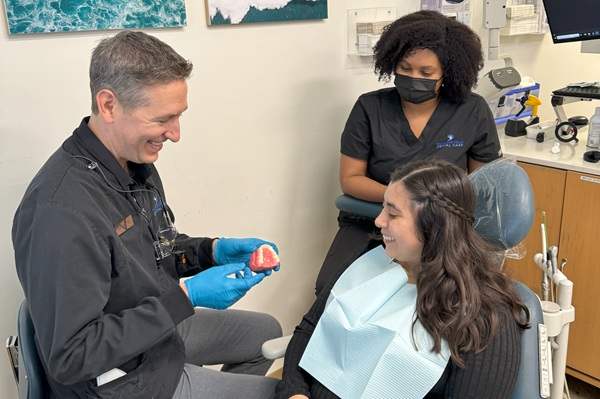Important Information About Root Canal Therapy

A root canal is a procedure that can save severely damaged or decayed teeth, prevent infection, and treat active infections. The process involves removing the pulp in the tooth’s pulp chamber and disinfecting the area. It often takes less than an hour from start to finish.
The pulp chamber of a tooth is the central chamber that is sealed from the rest of the tooth. It has nerves, blood vessels, and connective tissues. A tooth’s pulp plays a vital role in its development, but it is not needed once a tooth is fully grown. At that point, the tooth can get the nutrients that it needs from surrounding tissues.
Damage or decay that reaches a tooth’s pulp chamber will not go away on its own. The pain caused by the injury worsens over time, and the damage can lead to the tooth becoming infected.
Important things to know about root canal therapy
The following are a few of the things that patients should know if they think that they might need root canal therapy.
1. What does the root canal procedure look like?
Root canal therapy typically starts with the dentist administering a local anesthetic. They use a drill to make a hole into the pulp chamber. Files are then inserted into the hole and used to extract the pulp. The files are also used to clean the pulp chamber.
After that, the dentist inserts medication into the hole and reseals the tooth with a rubbery type of filling called gutta-percha. Teeth that have been fixed with root canals are usually rebuilt with composite resin or covered with crowns.
2. What types of dental issues can root canal therapy treat?
Dental issues that can be fixed with root canal therapy include:
- Severely broken, fractured, or decayed teeth
- Infections
3. Is root canal therapy always an option?
It depends on factors like how long a tooth has been damaged. If the damage affects the tooth’s root, an extraction might be the better option. An extraction might also be suggested if there is a significant risk of the infection expanding to other parts of the body, where it can have life-threatening consequences.
4. Does root canal therapy hurt?
No. Dentists inject the area being worked on with local anesthetics before the procedure, so the patient does not feel any pain as the dentist works on their damaged tooth.
Most patients do not report feeling significant pain even after the anesthetic wears off. At most, they might experience slight discomfort that can be managed with over-the-counter painkillers.
5. What are signs that I need a root canal?
Root canals therapy is needed when a tooth's pulp chamber has been damaged. This is the tooth's innermost layer that houses connective tissues, blood vessels, and nerves. These soft tissues are known as the pulp, and the pulp chamber prevents irritants in the mouth from reaching them.
Damage to a tooth caused by tooth decay or trauma can open up the pulp chamber, giving bacteria access to the soft tissues inside. This leads to the most common sign that a person needs a root canal: excruciating tooth pain that makes it impossible to get any sleep at night or focus during the day. Other signs that a person might need a root canal include increased sensitivity to hot, cold, sweet, and acidic foods; fever; pus coming out of a tooth's base; bad breath; and blood coming out from the insides of the tooth.
6. What is recovery like after getting a root canal?
There is no significant recovery period after root canal therapy. Any toothache that the patient was experiencing before their visit should be gone by the time that the procedure is over. It can take a few hours for the effects of the anesthetic to wear off, so dentists typically advise patients to avoid eating for a few hours after the procedure because they can accidentally bite into their tongue or cheeks.
Most people do not report significant discomfort following root canal therapy. Any pain should be minor and can typically be managed with over-the-counter painkillers like ibuprofen and acetaminophen.
Root canals save teeth
Root canal therapy enables dentists to save teeth when the pulp has been compromised. Do you think that you need a root canal? Give us a call or stop by our clinic to set up an appointment.
Request an appointment here: https://www.diamondheaddentalcare.com or call Diamond Head Dental Care at (808) 450-2101 for an appointment in our Honolulu office.
Check out what others are saying about our dental services on Yelp: Root Canal in Honolulu, HI.
Recent Posts
Root canal therapy is typically performed when a tooth's pulp chamber has been infected, irritated, or inflamed. The procedure involves cleaning out the contents of the pulp chamber, applying medication to the area to dry out any infection, and sealing the tooth with a special type of filling material called gutta-percha.Root canals have earned a…
When a tooth needs a root canal, it is usually because of either a deep cavity, a break, a crack, or a chip that has gone through the hard protective enamel of the tooth. Under the enamel is a softer tissue called dentin and then under the dentin in the center of the tooth is…
Root canal treatment is a dental restoration meant to preserve a tooth from destruction after wear caused by tooth decay. This therapy involves the removal of the infected tissue in the tooth to preserve oral health for the long haul.The dentist will remove the infected tissue, seal the roots of the tooth and subsequently reinforce…
If you think you might need a root canal, you want to pay attention to three primary signs. Although there are many additional symptoms you should know about, these, in particular, are the most important. More than likely, if you see a dentist at the onset of trouble, you can avoid a root canal. However,…


